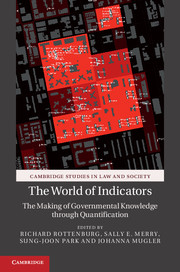Book contents
- Frontmatter
- Contents
- List of figures
- List of tables
- List of abbreviations
- List of contributors
- 1 A world of indicators: The making of governmental knowledge through quantification
- 2 The flight of the indicator
- 3 Narrating numbers
- 4 By their own account: (Quantitative) Accountability, Numerical Reflexivity and the National Prosecuting Authority in South Africa
- 5 Failure by the numbers? Settlement statistics as indicators of state performance in South African land restitution
- 6 Doing the transparent state: Open government data as performance indicators
- 7 Charting the road to eradication: Health facility data and malaria indicator generation in rural Tanzania
- 8 ‘Nobody is going to die’: An ethnography of hope, indicators and improvizations in HIV treatment programmes in Uganda
- 9 Financial indicators and the global financial crash
- 10 New global visions of microfinance: The construction of markets from indicators
- 11 Spirits of neoliberalism: ‘Competitiveness’ and ‘wellbeing’ indicators as rival orders of worth
- 12 Climate change vulnerability indicators: from noise to signal
- 13 Retroaction: how indicators feed back onto quantified actors
- Index
- Cambridge Studies in Law and Society
- References
4 - By their own account: (Quantitative) Accountability, Numerical Reflexivity and the National Prosecuting Authority in South Africa
Published online by Cambridge University Press: 05 October 2015
- Frontmatter
- Contents
- List of figures
- List of tables
- List of abbreviations
- List of contributors
- 1 A world of indicators: The making of governmental knowledge through quantification
- 2 The flight of the indicator
- 3 Narrating numbers
- 4 By their own account: (Quantitative) Accountability, Numerical Reflexivity and the National Prosecuting Authority in South Africa
- 5 Failure by the numbers? Settlement statistics as indicators of state performance in South African land restitution
- 6 Doing the transparent state: Open government data as performance indicators
- 7 Charting the road to eradication: Health facility data and malaria indicator generation in rural Tanzania
- 8 ‘Nobody is going to die’: An ethnography of hope, indicators and improvizations in HIV treatment programmes in Uganda
- 9 Financial indicators and the global financial crash
- 10 New global visions of microfinance: The construction of markets from indicators
- 11 Spirits of neoliberalism: ‘Competitiveness’ and ‘wellbeing’ indicators as rival orders of worth
- 12 Climate change vulnerability indicators: from noise to signal
- 13 Retroaction: how indicators feed back onto quantified actors
- Index
- Cambridge Studies in Law and Society
- References
Summary
Introduction
Accountability is a watchword firmly established in contemporary politics, policies and organizational life in many countries world-wide (UN 2007; Espeland and Vannebo 2007; Power 2008: XV). Presently there are calls for greater and more expansive forms of accountability; rarely do we hear of calls for less. In the simplest sense, accountability describes situations in which people, who have been entrusted with power and money, are required to explain and justify their decisions – in other words, when their resource allocation and their professional and ethical reasoning are scrutinized. It is, however, only rarely that accountability scholars highlight the concept's obscurity, vagueness and its ‘chameleon’-like character (except Sinclair 1995: 219; Boström and Garsten 2008: 5; Koppell 2005; Strathern 2000a). When, where, to whom and on what basis someone is made to be accountable can look very different, depending on the involved actors’ understandings of the concept.
It is often pointed out that expectations of how accountability should be produced are never static (Dowdle 2006). Heated debates around the ‘correct’ way to ensure that public officials work in the best interests of the public and remain trustworthy are nothing new (von Dornum 1997). Over the last ten to fifteen years, however, various scholars have noted that the rapid increase of quantitative forms of accountability in many governmental settings world-wide are radically shifting these debates (Power 1997; Shore and Wright 1999; Strathern 2000a; 2000b). When being accountable becomes more and more synonymous with using quantitative measures and creating supposedly ‘verifiable’ accounts, then, scholars argue, our understanding of how accountability can be defined and rendered becomes narrower. People will be less accepting and convinced by other forms and it becomes difficult for institutions to otherwise practice accountability, that is, without performance indicators, rankings, benchmarking and/or audits and more deliberative forms of account-giving (Espeland and Vannebo 2007: 40; Rottenburg 2000).
Although quantitative forms of accountability are in high demand because they appear to have the capacity to simplify complex social phenomena and make these more accessible to outsiders and lay people, critics point out that the increased transparency achieved through this ‘information reductionism’ is illusory and counterproductive (Tsoukas 1997: 829).
- Type
- Chapter
- Information
- The World of IndicatorsThe Making of Governmental Knowledge through Quantification, pp. 76 - 101Publisher: Cambridge University PressPrint publication year: 2015
References
- 6
- Cited by



